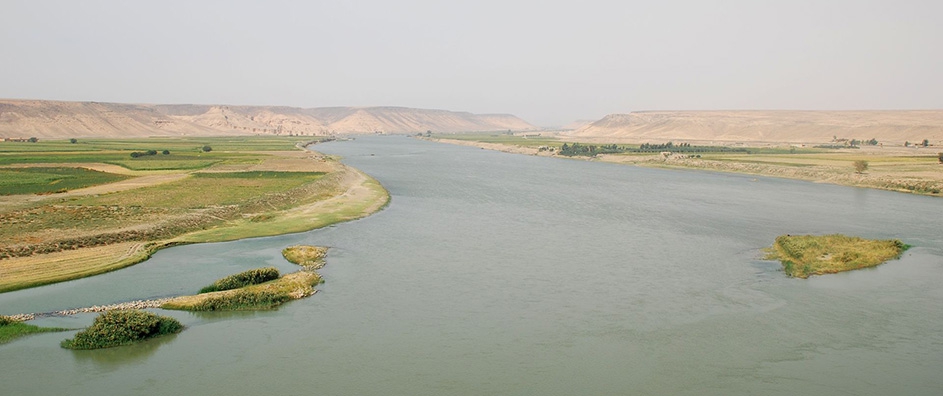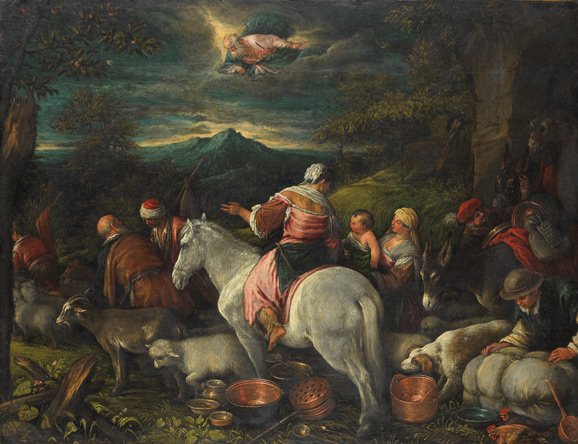The views expressed in our content reflect individual perspectives and do not represent the authoritative views of the Baha'i Faith.
Among the great prophets was His Holiness Abraham who being an iconoclast and a herald of the oneness of God, was banished from His native land. – Abdu’l-Baha, Baha’i World Faith, p. 270.
As Abraham and the exiles prepared to depart, they could look out from the high ground of the city and gaze over a green and fertile landscape created by the Euphrates. Rather than running neatly between parallel banks, the enormous river system branched and re-branched, forming a labyrinth made up of six thousand square miles of meandering creeks, shallow lakes, marshes, and islets. Marsh dwellers wove floating houses out of pliant reeds and poled their way through the landscape in bitumen-tarred skiffs curved gracefully as crescent moons. They netted fish, took eggs from the nests of wild birds, and gathered other edibles. Fanning out from the edge of the marsh were extensively irrigated fields that produced wheat, barley, onions, pomegranates, dates, and more. Nomads camped in seasonally green pastures near the river to fatten flocks of goats and sheep, whose wool, meat, milk, leather, and bone would be bartered for grain, spices, and other necessities.
The mosquito-plagued marshland could be roaringly dangerous during spring floods, fantastically hot and humid in summer, and treacherous in winter; but it was also lush and captivating. Blazing days melted into lavender evenings that were sometimes enlivened by the music of drums, cymbals, reed flutes, or lyres. It must have been agonizing for the exiles to accept that they could never return to “life in a land where great beds of huge, pale gold reeds reached up out of calm lakes; where nearly every villager held out a welcoming hand, where ducks and cormorants and herons rose in vast flocks to the skies . . .”
According to scripture, the ultimate destination of Abraham— the arena of action to which he, the newest divine Messenger, was being called by God—was the Land of Canaan. When Abraham was banished, however, Nimrod didn’t send him westward to Canaan. Instead, he pointed to the north, to the belly of Turkey, and named the town of Harran as the place of exile.
A plausible line of thought suggests Harran was chosen not because Nimrod especially liked it but because Abraham’s father, Terah, specifically requested it. The logic of this scenario rests on the notion that either Terah or his parents were natives of Harran.
The evidence pointing most directly to this is the similarity of the name of Terah’s youngest son, Haran, to the name of the town of Harran (indeed, many translations use the same spelling— Haran—for both names). If the reasoning is correct, the exiles might well have expected to receive help—shelter, food, and even a job—from their relatives.
Harran was situated in what is now southern Turkey, about twenty-five miles southeast of Urfa (usually listed on modern maps as Sanliurfa). It lay at the junction of several ancient trade routes, a fact reflected by the meaning of its name, generally translated as crossroads or highway.
To get there from Ur, Abraham and his companions followed a well-established route running to the northwest, paralleling the Euphrates and skirting the edge of the enormous Syrian Desert. After a month or two, and a distance of four to five hundred miles at a presumed pace of ten to twenty miles a day, they entered a broad river valley where winters were mild and summers very hot “‘with an abundance of gnats and lions.’”
The buildings of Harran lay along the banks of the river Jullab, a spring-fed tributary of a larger river, the Balikh, which in turn ran into the Euphrates. Established by Ur as a merchant outpost, the village was occupied primarily by a confederation of semi-nomadic tribes who catered to the needs of traders from many lands, including Egypt, Oman, Syria, Iran, Iraq, Afghanistan, northern Turkey, and even the Indus valley (the land along the Indus River, which runs all the way through the middle of Pakistan before flowing into the Arabian Sea). Harran would later expand into a wealthy, cosmopolitan city, but when Abraham arrived, it seems to have been not much more than a small settlement.
Once the family members had reached Harran, most of them must have sighed with relief. One can presume that Abraham, as a Messenger of God, saw dark clouds gathering on the horizon, but the others probably didn’t realize that their true destiny lay in Canaan rather than in Harran. As they lay down to sleep each night, Sarah, Lot, and Terah probably thought the worst was over.

















Comments
Sign in or create an account
Continue with Googleor